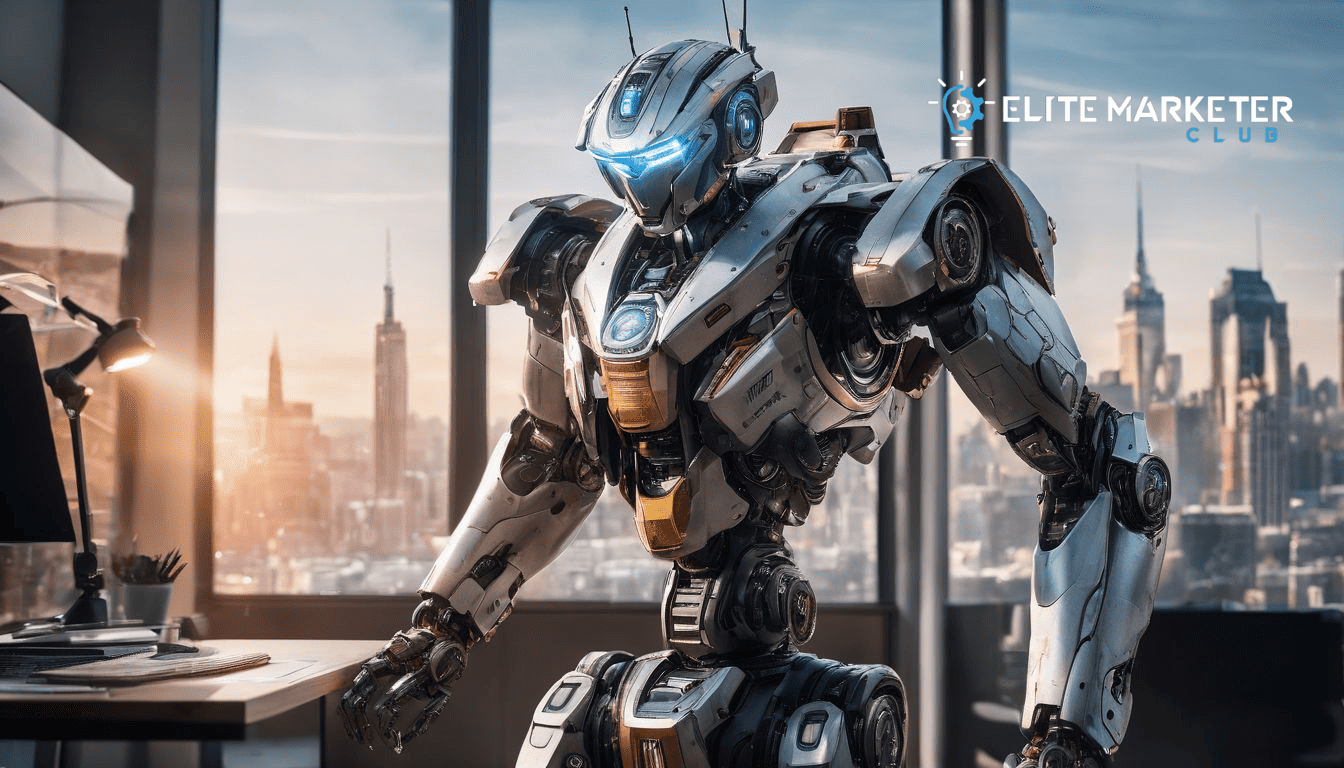Will AI Replace SEO in 2024? Exploring The Future Of Artificial Intelligence In Search Engine Optimization
The Future of SEO: Will AI Replace SEO?
If you’ve dipped your toes in the digital marketing pool, you might have heard whispers of AI reshaping landscapes, including that of SEO. It’s a common worry—will artificial intelligence take over search engine optimization duties? That’s the burning question on many marketers’ minds as they seek to stay ahead of the curve.
AI is stirring up online searches like never before, and people are eager for faster, more spot-on results. In this article, we will unravel just how much AI could rock the SEO boat—and whether it will leave any room for humans at the helm.
You’ll get a glimpse into ways they can work together instead of against each other—think teamwork with a techy twist! Ready to discover what lies beyond today’s SEO horizon? Let’s dive into a future where algorithms become allies!
Key Takeaways
- AI is reshaping SEO by making searches brighter and providing new tools for optimization.
- SEO still needs humans for creativity, strategy, and adapting content to user intent.
- Avoiding common SEO mistakes is crucial for ranking high in search engines.
- AI can handle tasks like data analysis, but the human touch remains critical in digital marketing.
- As AI technology grows, staying informed and using AI tools wisely will help in SEO success.
The Rise of AI in the Digital World

AI is making waves in the digital world. It’s transforming how we search, shop, and interact online. Every click and query now feeds into intelligent algorithms that learn from behavior.
This makes services like recommendations and search results smarter every day.
Companies are racing to adopt AI technologies. They want to stay ahead of trends and offer users the best experience. These AI advancements shape new tools for SEO experts to optimize content more effectively than ever before.
The digital landscape is changing fast, with AI leading the charge!
Understanding SEO in the Context of AI

Diving into the world of SEO, we’re now encountering a dynamic where artificial intelligence isn’t just knocking at the door—it’s already inside, redefining strategies and best practices.
This intersection between AI and SEO is a fascinating landscape where algorithms meet human ingenuity, promising a future where they don’t necessarily replace one another but might become the ultimate power duo in digital marketing.
The Basics of SEO
SEO stands for Search Engine Optimization. It means making your website easy to find on Google or other search engines. You want your site to appear as high as possible when people look for things you talk about or sell.
To do this, you need good keywords. Those are the words people type into the search box.
Your website must also be fast and work well on phones and computers. Links from other sites to yours help, too; they’re like votes saying your site is useful. Content is king in SEO—you need great articles or products people want to read and share.
AI algorithms are getting better at knowing what’s good, so quality matters!
Common SEO Mistakes to Avoid
SEO isn’t just about keywords and links. It’s about creating a smooth experience for both search engines and users. Making mistakes can hurt your website’s chances of ranking high.
- Ignoring technical SEO: Websites must be fast and easy to use. If you neglect this, even great content won’t help much.
- Skipping title tags and meta descriptions: These are key for telling search engines what your page is about. Missing out means missing potential clicks.
- Using too many keywords: Stuffing your content with keywords makes reading hard. Balance is crucial—write naturally for your audience.
- Forgetting mobile users: More people surf the web on phones now. Make sure your site looks good and works well on all devices.
- Overlooking analytics: Data tells you what’s working in your SEO strategy. Avoid guesswork; let the numbers guide you.
- Copying content: Search engines penalize duplicate content. Always strive for original, high-quality posts.
- Neglecting backlinks: Links from other sites boost credibility—but aim for quality over quantity!
- Forgoing local SEO: Local searches are extensive online. Don’t miss out; make sure local customers can find you.
- Missing updates on SEO practices: Stay informed! SEO changes fast, so keep up with the latest trends and adjustments.
- Disregarding user intent: Understand why people search. Give them what they’re looking for to increase relevance and engagement.
The Impact of AI on SEO
AI is changing search engine optimization in many ways. It works by making search engines more intelligent and more efficient. For example, Google uses AI to understand what people are looking for.
This means websites must be more precise and valuable to rank high. Also, AI can spot patterns in how people use the internet.
Because of AI, SEO experts have new tools at their disposal. They now use software that predicts which topics will become popular. This helps them create content ahead of time. Machines also do routine SEO tasks, like checking for broken links or suggesting keywords.
This lets humans focus on strategy and creative work—the things machines can’t do yet.
Collaboration and Future Possibilities between AI and SEO
Exploring the synergy between AI and SEO unveils a landscape ripe with opportunities for innovation—where artificial intelligence amplifies the reach of human creativity and strategic know-how, promising an exciting frontier for digital marketers to conquer.
SEO Tips for Beginners
Starting in SEO can seem daunting with AI changing the game. Adaptation is critical to success in the evolving digital marketing landscape.
- Learn the basics: Before diving into advanced techniques, understand what SEO stands for—Search Engine Optimization—and why it’s crucial for noticing your website.
- Research keywords: Find out what words people use when they search for content like yours. Use tools to see which keywords are popular and relevant.
- Create quality content: Write helpful, engaging posts that answer questions or solve problems. This makes visitors stay longer and helps your site rank higher.
- Optimize for mobile: Make sure your website looks good and works well on phones and tablets; many users will visit from these devices.
- Use meta tags: Title tags and meta descriptions tell search engines about your page’s content; use them wisely to improve visibility.
- Build links wisely: Get other reputable websites to link back to yours, but don’t overdo it – quality beats quantity in link building.
- Stay updated: SEO rules change often, especially with new AI technology surfacing. Keep learning to stay ahead of the curve.
- Utilize AI tools carefully: As AI becomes more common, use tools that improve efficiency but don’t over-rely on automation—personal touch matters.
- Monitor user behavior: Pay attention to how people interact with your website using analytics; it informs where you can enhance their experience.
- Be patient: SEO success doesn’t happen overnight; build strategies focusing on long-term growth and adapting as AI continues to influence the field.
Conclusion
AI is changing the game, no doubt about it. It’s making SEO faster and more innovative but not pushing out human SEO pros yet. Think of AI as a powerful tool in your SEO toolkit that can handle data and crunch numbers like never before.
Humans still need to steer the ship – creativity and strategy are our turf. So keep learning and using AI to boost those rankings; it’s a partnership with many potentials!

